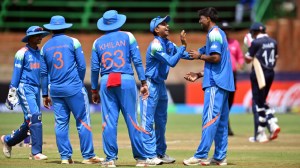Spell Bound
Beyond fairies and fandom,this is overwhelmingly a book about books
Tolkien understood about the things that happen after the end. Because this is after the end,this is all the Scouring of the Shire,this is figuring out how to live in the time that wasnt supposed to happen after the glorious last stand. I saved the world,or I think I did,and look,the world is still here,with sunsets and interlibrary loans. And it doesnt care about me any more than the Shire cared about Frodo. But that doesnt matter.
A teenaged girl with friends among the fairies fights her mother,a powerful and evil witch. Though she triumphs and saves the world,she loses her sister and receives a permanent injury.
But this is not the story of Among Others. When Jo Waltons book opens,what might in other stories be considered the main action of the plot has already taken place. Mori Phelps has already escaped her mother and faced her sisters death. She must now find her place among others her English fathers family Mori is Welsh and the girls at her boarding school. Sexual awakening,an increased understanding of gender dynamics and the perils of family are all things she learns to negotiate.
These themes adolescence,finding a place in the world,learning to engage with others,recognising how the world works,dealing with loss all seem far removed from the world of epic battles between good and evil. Walton based aspects of Among Others on events from her own life,and it reads as an authentic account of growing up. What makes it unusual is that Moris engagement with the world around her comes through books.
Often these are specific books. At the beginning of the book,a character expects her own experience with fairy magic to be similar to The Lord of the Rings. When Mori contemplates going to boarding school she wonders if it will be like the novels of Angela Brazil. A realisation that her parents read and discussed some of the same books as her is the first sense of them as real people. Moris gradual realisation of how the sexes are treated differently comes through the way female authors are discussed in her book club,and a performance of Shakespeares The Tempest.
Among Others is written for people who read; often references are not explained,but assume the knowledge of the reader. Mori joins a science fiction book club and has a series of discussions about books. Her views on sexual morality come from Robert Heinlein,then Samuel Delany,and she assumes that James Tiptree Jr. is a man. All of this will delight a reader who grew up in the genre the book is full of these little shibboleths that remind a certain sort of reader of a shared cultural experience. Often the emotional impact is massive; when,towards the end of the book,Walton quotes directly from Tolkien Huorns will help,it is overwhelming.
More than just the books,Among Others is clearly a love letter to the science fiction- and fantasy-reading community as a whole. But a more general love of reading keeps this accessible to even a person who does not pick up on all of Waltons references,or share her experiences with science fiction Fandom. You dont need to have read Samuel Delanys Babel-17 to understand that not having finished a good book seems a perfectly adequate reason to stay alive.
Despite all of the book discussions Among Others is a book about books before it is anything else,the epic fantasy plot does continue. Moris mother is a constant,lurking threat that surfaces from time to time,trying to break into her new life. If her frequent intrusions seem a bit incidental,this is because they are. Though there is a showdown at the end,it is never really the focus of the book; real living happens in the gaps that big narratives leave,and this too is a comment on literature. Subtly done but very present is another quest to save the elms of the world from Dutch Elm disease. Saving trees: Tolkien would have approved.
- 01
- 02
- 03
- 04
- 05































